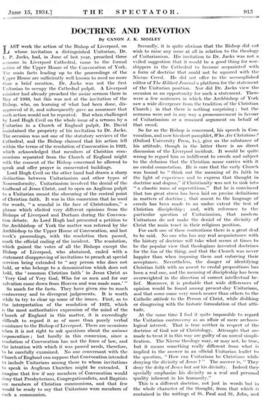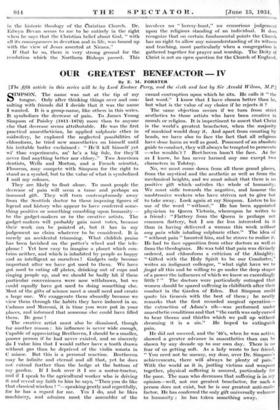DOCTRINE AND DEVOTION
By CANON J. K. MOZLEY
LAST week the action of the Bishop of Liverpool, on whose invitation a distinguished Unitarian, Dr. L. P. Jacks, had, in June of last year, preached three sermons in Liverpool Cathedral, came to the formal notice of the Upper House of the Convocation of York. The main facts leading up to the proceedings of the Upper House are sufficiently well known to need no more than a brief mention. Dr. Jacks was not the first Unitarian to occupy the Cathedral pulpit. A Liverpool minister had already preached the assize sermon there in May of 1933, but this was not at the invitation of the Bishop, who, on- learning of what had been done, dis- approved of it, and subsequently gave an assurance that such action would not be repeated. But when challenged by Lord Hugh Cecil on the whole issue of a sermon by a Unitarian in a Church of England pulpit, Dr. David • maintained the propriety of his invitation to Dr. Jacks. The occasion was not one of the- statutory services of the Cathedral, and the Bishop claimed that his action fell within the terms of the resolution of Convocation in 1922, which acknowledged that members of Christian com- munions separated from the Church of England might with the consent of the Bishop concerned be allowed to speak and offer prayer in consecrated buildings.
Lord Hugh Cecil on the other hand had drawn a sharp distinction between Unitarianism and other types of Nonconformity. Unitarianism involved the denial of the Godhead of Jesus Christ, and to open an Anglican pulpit to a Unitarian meant the obscuring of the central point of Christian faith. It was in this connexion that he used the words, " a scandal in the face of Christendom," a phrase which elicited very different opinions from the Bishops of Liverpool and Durham during the Convoca- tion debate. As Lord Hugh had presented a petition to the Archbishop of York the matter was referred by the Archbishop to the Upper House of Convocation, and last week's proceedings, with the resolution then passed, mark the official ending of the incident. The resolution, which gained the votes of all the Bishops except the Bishop of Liverpool, who abstained, ended with a statement disapproving of invitations to preach at special services being extended to " any person who does not hold, or who belongs to a denomination which does not hold, the ' common Christian faith ' in Jesus Christ as ' Very God of Very God, Who for us men and for our salvation came down from Heaven and was made man.' " So much for the facts. They have given rise to much controversy and to divergent judgements. It is worth while to try to clear up some of the issues. First, as to the interpretation of the resolution of 1922, which is the most authoritative expression of the mind of the Church of England in this matter, it is exceedingly difficult to regard it as of more than purely verbal assistance to the Bishop of Liverpool. There are occasions when it is not right to ask questions about the animus imponentium ; but hardly in this connexion, since a resolution of. Convocation has not the force of law, and the intention with which it was passed needs, therefore, to be carefully examined. No one conversant with the Church of England can suppose that Convocation intended to include Unitarians among those to whom invitations to speak in Anglican Churches might be extended. I imagine that few if any members of Convocation would deny that Presbyterians, Congregationalists, and Baptists are members of Christian communions, and that few would be ready to say that Unitarians were members of such a communion. Secondly, it is quite obvious that the Bishop did not wish to raise any issue at all in relation to the theology of Unitarianism. His invitation to Dr. Jacks was not a veiled suggestion that it would be a good thing for wor- shippers in the Cathedral to become acquainted with a form of doctrine that could not be squared with the Nicene Creed. He did not offer to the accomplished editor of The Llibbert Journal a platform for the statement of the Unitarian position. Nor did Dr. Jacks view the occasion as an opportunity for such a statement. There were a few sentences in which the Archbishop of York saw a wide divergence from the tradition of the Christian Church ; in that there is nothing surprising ; but the sermons were not in any way a pronouncement in favour of Unitarianism or a reasoned argument on behalf of that creed.
So far as the Bishop is concerned, his speech in Con- vocation, and now his short pamphlet, Who Are Christian.? (Oxford University Press, ls.), give us the substance of his attitude, though in the latter there is no direct discussion of the Liverpool incident. It would be quite wrong to regard him as indifferent to creeds and subject to the delusion that the Christian name carries with it no credal connotation. He is sure that the early Church was bound to " think out the meaning of its faith in the light of experience and to express that thought in doctrine and dogma," if Christianity was not to sink into " a chaotic mass of superstitions." But he is convinced that too great stress has been laid on precise definitions in matters of doctrine ; that assent to the language of creeds has been made to an undue extent the test of Christian discipleship ; and, with reference to the particular question of Unitarianism, that modern Unitarians do not make the denial of the divinity of Christ the main tenet in their religious position.
For each one of these contentions there is a great deal to be said. No one who has any real acquaintance with the history of doctrine will take what seems at times to be the popular view that theologians invented doctrines for the fun of the thing, and that the. Church was never happier than when imposing them and enforcing their acceptance. Nevertheless, the danger of identifying Christian faith with an assent to credal propositions has been a real one, and the meaning of discipleship has been overweighted in the direction of correct intellectual be- lief. Moreover, it is probable that wide differences of opinion would be found among present-day Unitarians, and that some come very much nearer than others to the Catholic attitude to the Person of Christ, while disliking or disagreeing with the historic formulation of that atti- tude.
At the same time I find it quite impossible to regard the Unitarian controversy as an affair of mere archaeo- logical interest. That is true neither in respect of the doctrine of God nor of Christology. Attempts that are made to treat it in this way are guilty of an unreal simpli- fication. The Nicene theology may, or may not, be true, but it means something really different from what is implied in the answer in an official Unitarian leaflet to the question, " How can Unitarians be Christians while denying the divinity of Jesus ? " The answer is, " They deny the deity of Jesus but not his divinity. Indeed they specially emphasize his divinity as a real and personal quality inherent in his humanity."
This is a different doctrine, not just in words but in the whole character of the thought, from that which is contained in the writings of St. Paul and St. John, and in the historic theology of the Christian Church. Dr. Edwyn Bevan seems to me to be entirely in the right when he says that the Christian belief about God, " with all its consequences in devotion and in life, was bound up with the view of Jesus asserted at Nicaea."
If that be so, there is very strong ground for the resolution which the Northern Bishops passed. This involves no " heresy-hunt," no censorious judgement upon the religious standing of an individual. It does recognize that on certain fundamental points the Church has no right to allow any misunderstanding of its witness and teaching, most particularly when a congregation is gathered together for prayer and worship. The Deity of Christ is not an open question for the Church of England.

















































 Previous page
Previous page